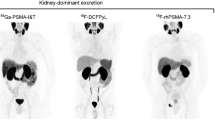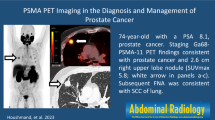Abstract
Background
Lutetium-177 prostate-specific membrane antigen (177Lu-PSMA) radioligand therapy is emerging as a promising treatment for metastatic castration-resistant prostate cancer refractory to established therapies. While there is an increasing body of survival and other data from retrospective analyses and prospective trials, there is no clear understanding of how best to predict therapy response and survival outcomes.
Objective
In this retrospective cohort analysis, we aimed to identify features that are associated with response to radioligand therapy and greater survival based on analysis of real-world data.
Patients and Methods
191 patients aged 70 ± 8 years with metastatic castration-resistant prostate cancer treated with radioligand therapy from November 2015 to February 2019 were included for analysis. Eligible patients had PSMA-expressing metastatic castration-resistant prostate cancer (confirmed by a 68Ga-PSMA-ligand positron emission tomography (PET)/computed tomography (CT) scan), an Eastern Cooperative Oncology Group performance status score ≤ 2 and no significant kidney, liver or bone marrow dysfunction (as characterised by kidney and liver function tests and a full blood count). Patients received one to five cycles of intravenous 177Lu-PSMA-ligand therapy. Endpoints included biochemical [prostate-specific antigen (PSA)] and radiologic (PSMA PET/CT) response, progression-free survival and overall survival, defined according to the Prostate Cancer Working Group 3 guidelines. Survival analysis was conducted by Kaplan–Meier estimation.
Results
Most individuals (89.5%) previously underwent first- and second-line systematic therapy. Of the 191 men treated with 452 cycles with mean injected activity of 6.1 ± 1.0 GBq per cycle, 159 patients were assessed for a biochemical response defined as a PSA decline ≥ 50% from baseline. A ≥ 50% PSA decline was observed in 89 (56%) patients, while any PSA decline occurred in 120 (75%) men. For the entire cohort, median values (interquartile range) of overall survival [n = 191], PSA progression-free survival [n = 132] and PET/CT progression-free survival were 12 (5–18), 4 (3–8) and 6 (3–10) months, respectively. Survival analysis confirmed better outcomes in individuals who had demonstrated therapy response. Predominantly lymph node metastatic disease and chemotherapy-naïve status were significant pre-therapy factors associated with longer survival. Baseline PSA was significantly linked to survival outcomes: lower levels predicted a lower risk of death and disease progression. Treatment-related adverse events included grade 3 or 4 haematological (12%), grade 1 or 2 renal (4.5%), and grade 3 or 4 clinical events (5.7%).
Conclusions
Our findings suggest that 177Lu-PSMA radioligand therapy provides a significant response rate with a low toxicity profile. The evidence promotes greater efficacy of radioligand therapy in predominantly lymph node metastatic castration-resistant prostate cancer, and in individuals with chemotherapy-naïve status and lower levels of baseline PSA.



Similar content being viewed by others
References
Rawla P. Epidemiology of prostate cancer. World J Oncol. 2019;10:63–89.
Cancer Council. Prostate cancer. 2020. https://www.cancer.org.au/about-cancer/types-of-cancer/prostate-cancer/. Accessed 24 Mar 2020.
Australian Institute of Health and Welfare. Cancer mortality. 2020. https://ncci.canceraustralia.gov.au/outcomes/cancer-mortality/cancer-mortality. Accessed 24 Mar 2020.
Yadav MP, Ballal S, Tripathi M, Damle NA, Sahoo RK, Seth A, et al. (177)Lu-DKFZ-PSMA-617 therapy in metastatic castration resistant prostate cancer: safety, efficacy, and quality of life assessment. Eur J Nucl Med Mol Imaging. 2017;44:81–91.
Emmett L, Willowson K, Violet J, Shin J, Blanksby A, Lee J. Lutetium (177) PSMA radionuclide therapy for men with prostate cancer: a review of the current literature and discussion of practical aspects of therapy. J Med Radiat Sci. 2017;64:52–60.
von Eyben FE, Singh A, Zhang J, Nipsch K, Meyrick D, Lenzo N, et al. (177)Lu-PSMA radioligand therapy of predominant lymph node metastatic prostate cancer. Oncotarget. 2019;10:2451–61.
Tannock IF, de Wit R, Berry WR, Horti J, Pluzanska A, Chi KN, et al. Docetaxel plus prednisone or mitoxantrone plus prednisone for advanced prostate cancer. N Engl J Med. 2004;351:1502–12.
de Bono JS, Oudard S, Ozguroglu M, Hansen S, Machiels J-P, Kocak I, et al. Prednisone plus cabazitaxel or mitoxantrone for metastatic castration-resistant prostate cancer progressing after docetaxel treatment: a randomised open-label trial. Lancet. 2010;376:1147–54.
de Bono JS, Logothetis CJ, Molina A, Fizazi K, North S, Chu L, et al. Abiraterone and increased survival in metastatic prostate cancer. N Engl J Med. 2011;364:1995–2005.
Cornford P, Bellmunt J, Bolla M, Briers E, De Santis M, Gross T, et al. EAU-ESTRO-SIOG guidelines on prostate cancer. Part II: Treatment of relapsing, metastatic, and castration-resistant prostate cancer. Eur Urol. 2017;71:630–42.
Parker C, Nilsson S, Heinrich D, Helle SI, O’Sullivan JM, Fosså SD, et al. Alpha emitter radium-223 and survival in metastatic prostate cancer. N Engl J Med. 2013;369:213–23.
Kantoff PW, Higano CS, Shore ND, Berger ER, Small EJ, Penson DF, et al. Sipuleucel-T immunotherapy for castration-resistant prostate cancer. N Engl J Med. 2010;363:411–22.
Antonarakis ES, Kibel AS, Yu EY, Karsh LI, Elfiky A, Shore ND, et al. Sequencing of Sipuleucel-T and androgen deprivation therapy in men with hormone-sensitive biochemically recurrent prostate cancer: a phase II randomized trial. Clin Cancer Res. 2017;23:2451.
Madan RA, Antonarakis ES, Drake CG, Fong L, Yu EY, McNeel DG, et al. Putting the pieces together: completing the mechanism of action jigsaw for Sipuleucel-T. J Natl Cancer Inst. 2020;112:562–73.
Gao J, Ward JF, Pettaway CA, Shi LZ, Subudhi SK, Vence LM, et al. VISTA is an inhibitory immune checkpoint that is increased after ipilimumab therapy in patients with prostate cancer. Nat Med. 2017;23:551–5.
Goswami S, Aparicio A, Subudhi SK. Immune checkpoint therapies in prostate cancer. Cancer J. 2016;22:117–20.
Jones W, Griffiths K, Barata PC, Paller CJ. PSMA theranostics: review of the current status of PSMA-targeted imaging and radioligand therapy. Cancers. 2020;12:1367.
Fendler WP, Rahbar K, Herrmann K, Kratochwil C, Eiber M. 177Lu-PSMA radioligand therapy for prostate cancer. J Nucl Med. 2017;58:1196–200.
Ahmadzadehfar H, Wegen S, Yordanova A, Fimmers R, Kürpig S, Eppard E, et al. Overall survival and response pattern of castration-resistant metastatic prostate cancer to multiple cycles of radioligand therapy using [(177)Lu]Lu-PSMA-617. Eur J Nucl Med Mol Imaging. 2017;44:1448–54.
Violet J, Sandhu S, Iravani A, Ferdinandus J, Thang S-P, Kong G, et al. Long-term follow-up and outcomes of retreatment in an expanded 50-patient single-center phase II prospective trial of (177)Lu-PSMA-617 theranostics in metastatic castration-resistant prostate cancer. J Nucl Med. 2020;61:857–65.
Fendler WP, Reinhardt S, Ilhan H, Delker A, Böning G, Gildehaus FJ, et al. Preliminary experience with dosimetry, response and patient reported outcome after 177Lu-PSMA-617 therapy for metastatic castration-resistant prostate cancer. Oncotarget. 2017;8:3581–90.
Kim YJ, Kim Y-I. Therapeutic responses and survival effects of 177Lu-PSMA-617 radioligand therapy in metastatic castrate-resistant prostate cancer: a meta-analysis. Clin Nucl Med. 2018;43:728–34.
Hofman MS, Violet J, Hicks RJ, Ferdinandus J, Thang SP, Akhurst T, et al. [177Lu]-PSMA-617 radionuclide treatment in patients with metastatic castration-resistant prostate cancer (LuPSMA trial): a single-centre, single-arm, phase 2 study. Lancet Oncol. 2018;19:825–33.
Sweat SD, Pacelli A, Murphy GP, Bostwick DG. Prostate-specific membrane antigen expression is greatest in prostate adenocarcinoma and lymph node metastases. Urology. 1998;52:637–40.
Chang SS. Overview of prostate-specific membrane antigen. Rev Urol. 2004;6(Suppl. 10):S13–8.
Lütje S, Heskamp S, Cornelissen AS, Poeppel TD, van den Broek SAMW, Rosenbaum-Krumme S, et al. PSMA ligands for radionuclide imaging and therapy of prostate cancer: clinical status. Theranostics. 2015;5:1388–401.
Scher HI, Morris MJ, Stadler WM, Higano C, Basch E, Fizazi K, et al. Trial design and objectives for castration-resistant prostate cancer: updated recommendations from the Prostate Cancer Clinical Trials Working Group 3. J Clin Oncol. 2016;34:1402–18.
Calopedos RJS, Chalasani V, Asher R, Emmett L, Woo HH. Lutetium-177-labelled anti-prostate-specific membrane antigen antibody and ligands for the treatment of metastatic castrate-resistant prostate cancer: a systematic review and meta-analysis. Prostate Cancer Prostatic Dis. 2017;20:352–60.
Rahbar K, Ahmadzadehfar H, Kratochwil C, Haberkorn U, Schäfers M, Essler M, et al. German multicenter study investigating 177Lu-PSMA-617 radioligand therapy in advanced prostate cancer patients. J Nucl Med. 2017;58:85–90.
Bräuer A, Grubert LS, Roll W, Schrader AJ, Schäfers M, Bögemann M, et al. (177)Lu-PSMA-617 radioligand therapy and outcome in patients with metastasized castration-resistant prostate cancer. Eur J Nucl Med Mol Imaging. 2017;44:1663–70.
Yadav MP, Ballal S, Sahoo RK, Dwivedi SN, Bal C. Radioligand therapy with (177)Lu-PSMA for metastatic castration-resistant prostate cancer: a systematic review and meta-analysis. AJR Am J Roentgenol. 2019;213:275–85.
Heck MM, Tauber R, Schwaiger S, Retz M, D’Alessandria C, Maurer T, et al. Treatment outcome, toxicity, and predictive factors for radioligand therapy with (177)Lu-PSMA-I&T in metastatic castration-resistant prostate cancer. Eur Urol. 2019;75:920–6.
Sathekge M, Bruchertseifer F, Vorster M, Lawal IO, Knoesen O, Mahapane J, et al. Predictors of overall and disease-free survival in metastatic castration-resistant prostate cancer patients receiving (225)Ac-PSMA-617 radioligand therapy. J Nucl Med. 2020;61:62–9.
Yadav MP, Ballal S, Bal C, Sahoo RK, Damle NA, Tripathi M, et al. Efficacy and safety of 177Lu-PSMA-617 radioligand therapy in metastatic castration-resistant prostate cancer patients. Clin Nucl Med. 2020;45:19–31.
Barber TW, Singh A, Kulkarni HR, Niepsch K, Billah B, Baum RP. Clinical outcomes of (177)Lu-PSMA radioligand therapy in earlier and later phases of metastatic castration-resistant prostate cancer grouped by previous taxane chemotherapy. J Nucl Med. 2019;60:955–62.
von Eyben FE, Roviello G, Kiljunen T, Uprimny C, Virgolini I, Kairemo K, et al. Third-line treatment and (177)Lu-PSMA radioligand therapy of metastatic castration-resistant prostate cancer: a systematic review. Eur J Nucl Med Mol Imaging. 2018;45:496–508.
Yordanova A, Linden P, Hauser S, Feldmann G, Brossart P, Fimmers R, et al. The value of tumor markers in men with metastatic prostate cancer undergoing [(177) Lu]Lu-PSMA therapy. Prostate. 2020;80:17–27.
Gallyamov M, Meyrick D, Barley J, Lenzo N. Renal outcomes of radioligand therapy: experience of 177lutetium-prostate-specific membrane antigen ligand therapy in metastatic castrate-resistant prostate cancer. Clin Kidney J. 2019;13(6):1049–55.
Acknowledgements
The authors thank Drs. Guiseppe Cardaci, David Macfarlane and Catherine Lucas for their care of patients included in this retrospective study. The permission granted by participants to use data for research and analysis purposes is gratefully acknowledged.
Author information
Authors and Affiliations
Corresponding author
Ethics declarations
Funding
No external funding was used in the preparation of this article.
Conflict of Interest
Danielle Meyrick, Marat Gallyamoa, Shanthi Sabarimurugan, Nadia Falzone and Nat Lenzo have no conflicts of interest that are directly relevant to the content of this article.
Ethics Approval
The study was conducted in accordance with institutional ethical compliance for off-trial palliative treatment of patients with metastatic castration-resistant prostate cancer on a compassionate basis. From a regulatory perspective, this is provided under Category A of the Therapeutic Goods Administration Special Access Scheme.
Consent to Participate
Written informed consent for publication was obtained from all patients.
Consent for Publication
Not applicable.
Availability of Data and Material
Data and material are available after request to the corresponding author.
Code Availability
Not applicable.
Author Contributions
All authors contributed to the study conception and design. Material preparation, data collection and analysis were performed by Marat Gallyamov, Shanthi Sabarimurugan and Danielle Meyrick. The first draft of the manuscript was written by Marat Gallyamov and Danielle Meyrick, final editing performed by Nadia Falzone, Danielle Meyrick and Nat Lenzo and all authors commented on previous versions of the manuscript. All authors read and approved the final manuscript.
Rights and permissions
About this article
Cite this article
Meyrick, D., Gallyamov, M., Sabarimurugan, S. et al. Real-World Data Analysis of Efficacy and Survival After Lutetium-177 Labelled PSMA Ligand Therapy in Metastatic Castration-Resistant Prostate Cancer. Targ Oncol 16, 369–380 (2021). https://doi.org/10.1007/s11523-021-00801-w
Accepted:
Published:
Issue Date:
DOI: https://doi.org/10.1007/s11523-021-00801-w




